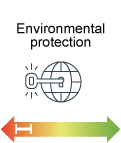| 2021–22 key activities: | |
|---|---|
| 4.1 | Work with other Australian Government agencies and other International Maritime Organization (IMO) member states adopt the short-term global measures to reduce greenhouse gas emissions from shipping under the IMO Initial Greenhouse Gas Strategy (IMO GHG Strategy) which is to reduce the carbon intensity of shipping by at least 40% by 2030 |
| 4.2 | Conduct a random sampling program of ship fuel to prevent sulphur emissions, including independent testing to validate the accuracy of bunker delivery notes against the fuel sampled, and publishing our testing outcomes |
| 4.3 | Draw on strategic partners to develop our operational intelligence capabilities to improve our ability to predict extreme weather events and proactively prepare for incidents |
| 2022–25 key activities: | |
|---|---|
| 4.4 | Work with Australian stakeholders and other IMO member states to finalise the technical guidelines that will be required to implement the short-term measure to reduce GHG emissions from shipping |
| 4.5 | Work with other regulators to ensure maritime safety and pollution issues are integrated into developing and emerging regulatory systems for alternative energy solutions, e.g. windfarms, solar arrays, wave generation |
| 4.6 | Work with other Australian Government agencies and IMO member states to develop and agree the final IMO GHG Strategy |
| Primary Enterprise risk | High Risk Rating | Key mitigation strategies |
|---|---|---|
| (3) AMSA fails to respond appropriately to climate change and other environmental impacts | Risk Appetite & Tolerance
| Key mitigation strategies include regular reporting and monitoring compliance and AMSA emergency response capabilities are aligned with the risk environment. Risk tolerance statement: We have low tolerance for activities which increase the risk of pollution in Australian waters. We have low tolerance for risks associated with the conduct of environmental response operations, recognising that operations can occur in hazardous and sensitive environments. |
